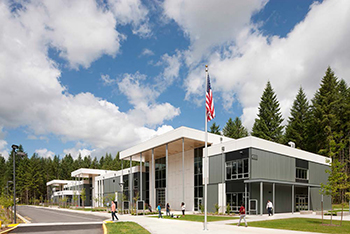FETC Announces 2016 STEM Excellence Award Winners
 ORLANDO, Fla. —Winners of the 2016 Future of Education Technology Conference (FETC) STEM Excellence Awards were announced at the annual event in Orlando on Jan. 14. The awards honor excellence and innovation in the areas of science, technology, engineering and mathematics (STEM) at the primary, middle and high school levels. Finalists were evaluated based on their use of interdisciplinary curriculum, collaboration, design, problem solving and various STEM offerings.
ORLANDO, Fla. —Winners of the 2016 Future of Education Technology Conference (FETC) STEM Excellence Awards were announced at the annual event in Orlando on Jan. 14. The awards honor excellence and innovation in the areas of science, technology, engineering and mathematics (STEM) at the primary, middle and high school levels. Finalists were evaluated based on their use of interdisciplinary curriculum, collaboration, design, problem solving and various STEM offerings.
High School Division
Taking top honors in the high school division was the 64,000-square-foot Nikola Tesla STEM High School in Redmond, Wash. Integrus Architecture, with offices in Spokane and Seattle; the Seattle office of Heery International; and Absher Construction of Puyallup, Wash., all worked on the project. The school opened in 2012, and the team’s use of 161 prefabricated modular units helped speed up the construction schedule.
The facility features strategic orientation and extensive daylighting, a high-performance thermal envelope system, pervious paving and bioswales for 100 percent on-site stormwater management, and a 10-kilowatt photovoltaic system with net metering. The school is organized into academic clusters with dedicated learning settings and studios. Space is also dedicated to student presentation areas and commons where students can study in groups or independently.
Middle School Division
The STEM Academy of Savannah, Ga., received the STEM Excellence Award for the middle school division. The nearly 700-student school was the first in the state to receive STEM certification from the Georgia Department of Education, thanks in part to its work to build connections with local community and business partners.
The structure originally housed Bartlett Middle School and was converted to a STEM facility in 2013, offering a challenging and rigorous STEM curriculum. For example, the school has integrated the flipped classroom method, and students rely more on iPads than textbooks. Popular courses and programs include Lego robotics and broadcasting.
Elementary School Division
The elementary school division prize went to Douglas L. Jamerson Jr. Elementary in St. Petersburg, Fla. The school opened in 2003 with a curriculum that focuses on high-quality, research-based programs delivered by specially selected and trained educators. Each member of the school’s teaching staff is National Board trained, and 60 percent hold a master’s degree or higher. The school has also won numerous awards, and the engineering curriculum in particular is currently be adapted for use in university programs and classrooms across the country, according to the school’s website.
Finalists
The winning schools were chosen from hundreds of applicants, with a pool of three finalists in each division. Finalists in the high school division included Blue Valley Center for Advanced Professional Studies in Overland Park, Kan., and Immaculata-La Salle High School in Miami. Middle school division finalists were Laing Middle School of Science and Technology in Mount Pleasant, S.C., and Renton Prep in Renton, Wash. Elementary school finalists included The Evergreen School in Shoreline, Wash., and Jack Anderson Elementary in Hendersonville, Tenn.
Winners were selected by the FETC STEM Advisory Board, which includes K-12 and university educators, STEM leaders and technology experts from across the nation.
